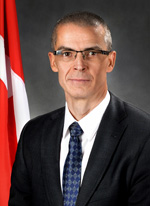Canadian Security Intelligence Service
Meet our Director
Our Priorities
-
Security Screening
Assisting the Government of Canada in preventing individuals who pose a threat to the security of Canada from either entering or obtaining status in this country.
-
Terrorism
Investigating the threat or the use of violence against persons or property for the purpose of achieving political, religious or ideological objectives.
-
Weapons of Mass Destruction
Investigating a growing number of foreign states and terrorist organizations that seek to develop and produce weapons of mass destruction, including chemical, biological, nuclear, and radiological weapons.
-
Espionage and Foreign Interference
Investigating clandestine activities by foreign governments that put Canada's national security at risk.
-
Cybersecurity and Critical Infrastructure Protection
Investigating threats against critical information systems and infrastructure posed by foreign countries, terrorists, and hackers.
Featured
As I write these words, many in our nation are still coming to terms with the events of last fall when two Canadians, radicalized to violence, launched separate attacks against fellow citizens, one in Saint-Jean-sur-Richelieu, Quebec, and the other in Ottawa. Two unarmed members of the Canadian Armed Forces were killed. The Canadian Security Intelligence Service (CSIS) joined the rest of the country in mourning their loss.
The attacks exposed in a most vivid way the vulnerability to terrorism that an open society like Canada faces. There was a period after 9-11 when many people assumed that an effective terrorist attack was necessarily one that involved a network of highly trained operatives bent on committing a spectacular, mass-casualty event. In truth, a single assailant with low-tech weaponry – a rifle or even a car – can bring tragedy and insecurity to our communities, as we saw in Canada.
That Canada is not immune to this kind of violence has long been clear to those of us in the national security community – and to anyone else who follows the news of the day. The October attacks in Saint-Jean-sur-Richelieu and Ottawa were not the only major terrorism-related story of 2014. A month earlier, in an Ottawa courtroom, a 34-year-old Canadian was convicted of planning to commit acts of terrorism in Canada. The sentencing hearing was notable not just for the lengthy prison term given to the accused – 24 years – but for the court’s vivid reaction to what the individual intended to do.
“You are now a convicted terrorist,” said the presiding judge. “That fact carries with it an utterly deplorable stigma that is likely impossible to erase … You have betrayed the trust of your government and your fellow citizens. You have effectively been convicted of treason, an act that invites universal condemnation among sovereign states throughout the world.”
An accomplice was also convicted of terrorism-related offences and sentenced to 12 years. The evidence presented in court indicated that the men were seeking to establish a functioning terrorist cell in Canada; they might have succeeded if not – to quote the judge again – for the “vigilant and tireless” work of our national security agencies. The scope of the problem was further illustrated when terrorism- related charges were laid against a 15-year-old boy from Montreal in December 2014, and then against a group of Ottawa men in January 2015.
There are violent people and violent groups that want to kill Canadians. It’s a sobering observation to make, and there is no euphemistic way of making it.
During the review period of the CSIS 2013-14 Public Report, the phenomenon of so-called foreign fighters gained increased prominence. The attention and concern has in my view been entirely legitimate. The fanaticism associated with al-Qaeda and murderous off-shoots such as the Islamic State in Iraq and the Levant (ISIL) is resonating with some individuals in Canada.
Community leaders, teachers and most of all parents have seen young people pursue a cause that has no good outcome. A number of these young Canadians have died in the foreign lands to which they have been drawn. There is no doubt that some of these Canadians have also killed people.
CSIS has been clear about the security challenge. We are interested in Canadian extremists who return to this country more radicalized than when they departed. Will their status as veterans of a foreign conflict better enable them to recruit other Canadians? Will they use their foreign contacts to set up networks in Canada to facilitate the movement of fighters, material and money in and out of the country?
And, most importantly, will they use their terrorist training to attempt violent acts here in Canada? Europe has already suffered such attacks. 2015 began with the January massacres in Paris at a magazine office and a Jewish grocery store. At least one of the attackers was reported to have had terrorist training in Yemen. Some months earlier, a French citizen and “returnee” from Syria went on a shooting spree in Belgium and killed a number of innocent civilians.
Even if a Canadian extremist does not immediately return, he or she is still a Canadian problem. Just as Canada expects other nations to prevent their citizens from harming Canadians and Canadian interests, we too are obligated to deny Canadian extremists the ability to kill and terrorize people of other countries. And, lastly, there is the threat posed here by frustrated extremists who have been unable to join the fight abroad. It is for all of these reasons, as our Public Report makes clear, that terrorism continues to be the most significant threat to Canada’s security interests.
Terrorism, however, is far from the only threat. Espionage against Canada’s economic, political and military interests is an ongoing concern. In December 2013, a Canadian citizen living in Ontario was arrested and charged under the Security of Information Act for allegedly passing sensitive information to a foreign entity. This was barely nine months after another Canadian, naval officer Jeffrey Delisle, was sentenced to 20 years in prison also for violating the Security of Information Act and selling secrets to a hostile foreign entity.
These espionage cases are high-profile for the simple fact that they met a criminal threshold and became publicly known. Cyber intrusions orchestrated by hostile foreign states, such as the one in the summer of 2014 against the National Research Council of Canada, are also increasingly of concern. There are many other activities occurring all the time in Canada – not just espionage but clandestine foreign influence – and while not in the public eye, they are equally damaging to Canadian security and sovereignty.
The year 2014 marked the 30th anniversary of the creation of CSIS. We are proud that in these past three decades we have matured into a valued and respected Canadian institution (see “Thirty Years of National Security”, page 9). The work we do is complex and sensitive, seemingly more so every year in a constantly changing threat environment.
Yet ever constant is our commitment not only to fulfill our mandate of keeping Canada and Canadians safe, but to do so in a way that is consistent with Canadian values. We promise to do so for the next 30 years, and beyond.

Michel Coulombe
- Date modified:









